IT consultants play a key role in helping organizations leverage technology to achieve their business goals. They provide expert advice, implement solutions, and ensure that IT systems are aligned with the company's objectives.
Skills required for an IT consultant include a deep understanding of various technologies, strong analytical abilities, and excellent communication skills. These professionals must be able to assess a company's needs, recommend appropriate solutions, and guide the implementation process.
Candidates can write these abilities in their resumes, but you can’t verify them without on-the-job IT Consultant skill tests.
In this post, we will explore 8 essential IT Consultant skills, 10 secondary skills and how to assess them so you can make informed hiring decisions.
Table of contents
8 fundamental IT Consultant skills and traits
The best skills for IT Consultants include Technical Expertise, Problem-Solving, Project Management, Communication, Analytical Thinking, Cybersecurity Knowledge, Business Acumen and Adaptability.
Let’s dive into the details by examining the 8 essential skills of a IT Consultant.
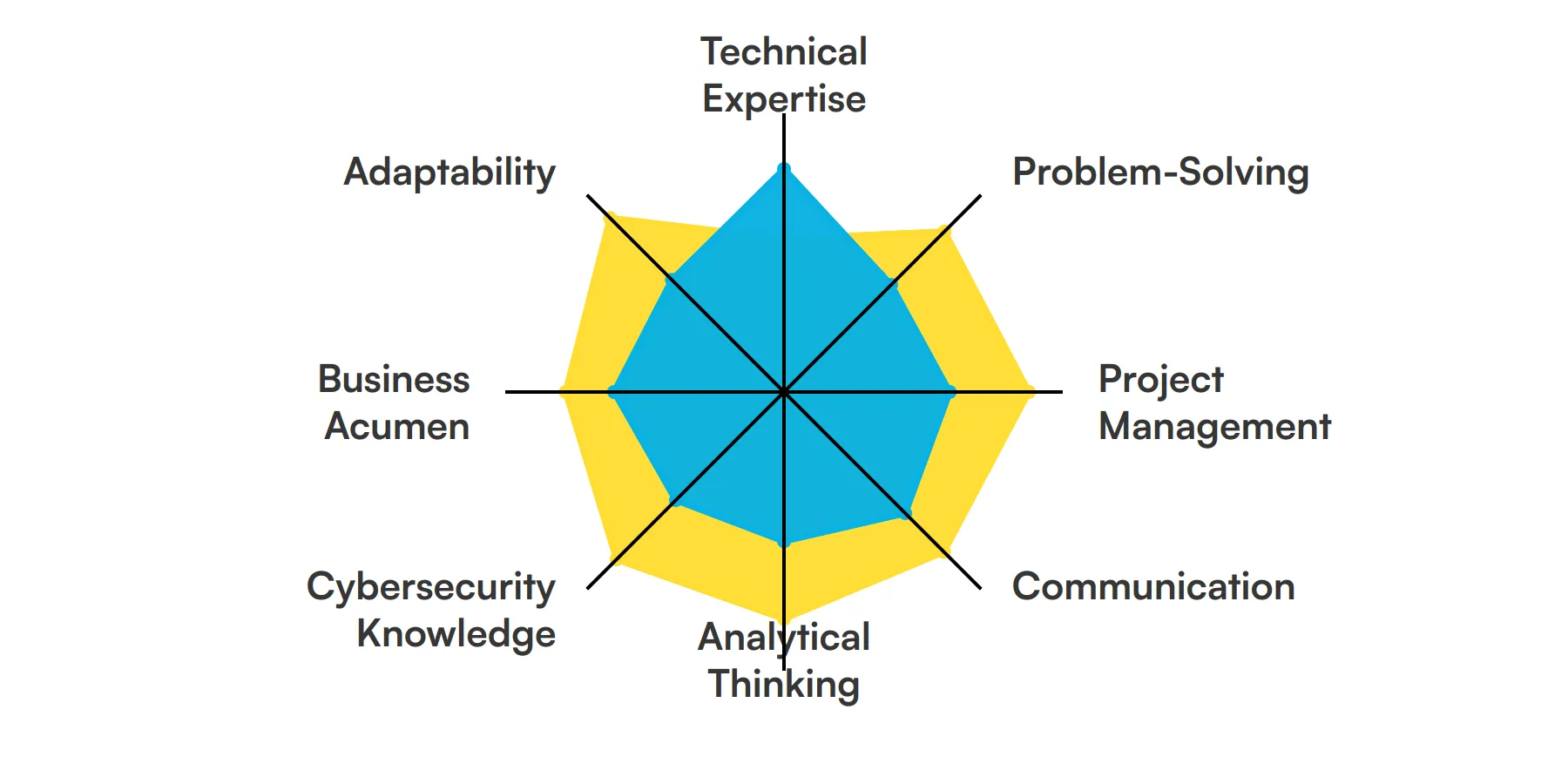
Technical Expertise
An IT consultant must have a deep understanding of various technologies, including software, hardware, and networking. This knowledge allows them to provide informed recommendations and troubleshoot complex issues effectively.
For more insights, check out our guide to writing a IT Consultant Job Description.
Problem-Solving
IT consultants are often called upon to resolve technical challenges. Strong problem-solving skills enable them to diagnose issues quickly and implement effective solutions, ensuring minimal disruption to business operations.
Project Management
Managing IT projects requires a consultant to plan, execute, and oversee projects from start to finish. This skill ensures that projects are completed on time, within scope, and on budget, meeting the client's expectations.
Communication
Clear and concise communication is crucial for IT consultants. They need to explain technical concepts to non-technical stakeholders, ensuring everyone is on the same page and facilitating smooth project execution.
Analytical Thinking
IT consultants must analyze data and systems to identify inefficiencies and areas for improvement. Analytical thinking helps them make data-driven decisions that enhance system performance and business processes.
Check out our guide for a comprehensive list of interview questions.
Cybersecurity Knowledge
With the increasing threat of cyber attacks, IT consultants must be well-versed in cybersecurity practices. This knowledge helps them protect client data and systems from potential breaches and vulnerabilities.
Business Acumen
Understanding the client's business environment and objectives is essential for IT consultants. This skill allows them to align IT strategies with business goals, ensuring that technology investments deliver maximum value.
For more insights, check out our guide to writing a Business Analyst Job Description.
Adaptability
The IT landscape is constantly evolving, and consultants must be able to adapt to new technologies and methodologies. This flexibility ensures they can provide relevant and up-to-date solutions to their clients.
10 secondary IT Consultant skills and traits
The best skills for IT Consultants include Database Management, Cloud Computing, Networking, Software Development, Vendor Management, IT Compliance, Data Analysis, Technical Writing, Training and Support and DevOps.
Let’s dive into the details by examining the 10 secondary skills of a IT Consultant.
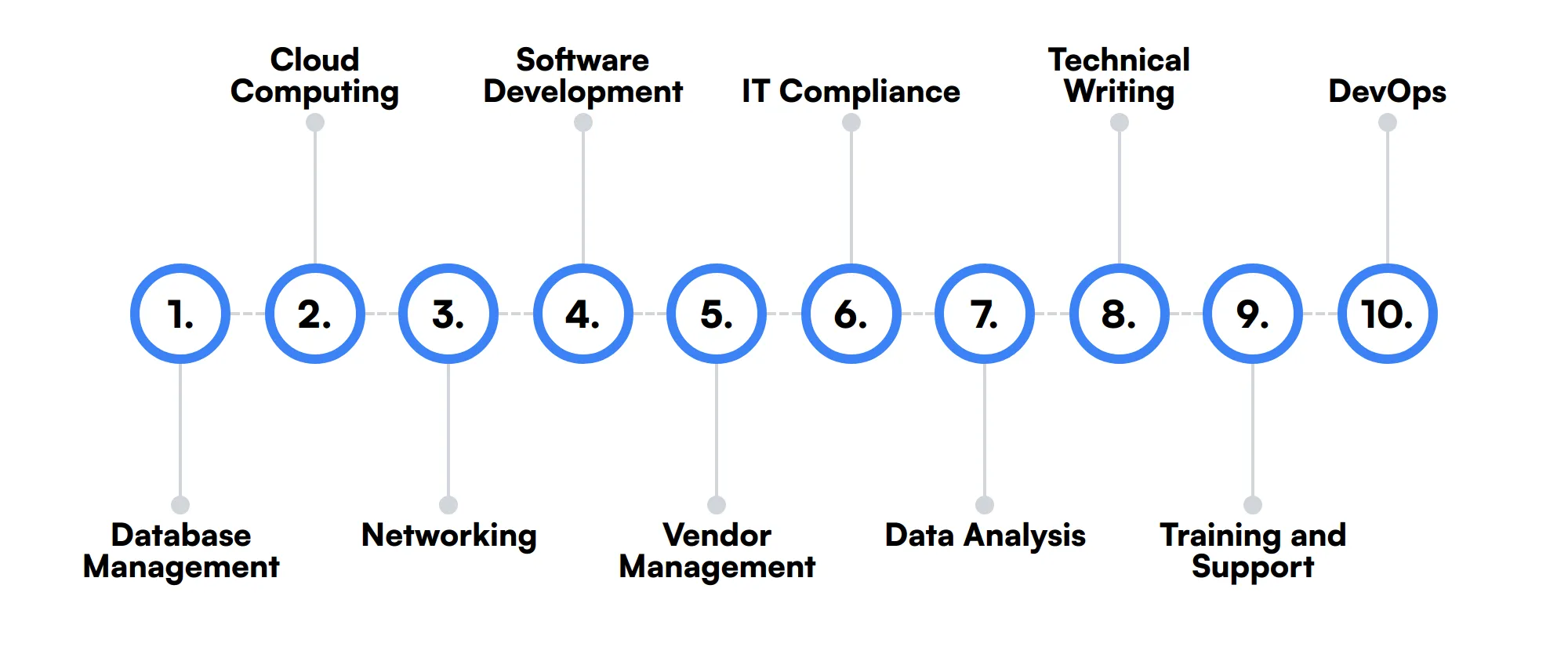
Database Management
Knowledge of database systems and management is beneficial for IT consultants. It allows them to design, implement, and maintain databases that support business operations efficiently.
Cloud Computing
Familiarity with cloud platforms like AWS, Azure, or Google Cloud is increasingly important. IT consultants use this skill to help clients migrate to the cloud, optimize cloud resources, and manage cloud-based applications.
Networking
Understanding network infrastructure and protocols is useful for IT consultants. This skill helps them design and troubleshoot network systems, ensuring reliable and secure connectivity for their clients.
Software Development
Basic knowledge of software development can be advantageous. IT consultants with this skill can better understand client needs, recommend appropriate software solutions, and even assist in custom software development projects.
Vendor Management
IT consultants often work with third-party vendors to procure hardware, software, and services. Effective vendor management ensures that clients receive quality products and services at competitive prices.
IT Compliance
Understanding regulatory requirements and industry standards is important for IT consultants. This knowledge helps them ensure that their clients' IT systems comply with relevant laws and regulations, avoiding potential legal issues.
Data Analysis
Proficiency in data analysis tools and techniques can enhance an IT consultant's ability to provide insights and recommendations. This skill helps in making informed decisions based on data trends and patterns.
Technical Writing
The ability to create clear and comprehensive technical documentation is valuable. IT consultants use this skill to produce user manuals, system documentation, and project reports that are easy to understand.
Training and Support
Providing training and support to end-users is often part of an IT consultant's role. This skill ensures that clients can effectively use new systems and technologies, maximizing the benefits of IT investments.
DevOps
Knowledge of DevOps practices can be beneficial. IT consultants with this skill can help clients streamline their development and operations processes, improving efficiency and reducing time-to-market for new applications.
How to assess IT Consultant skills and traits
Assessing the skills and traits of IT consultants involves more than just glancing at their resumes. While resumes may highlight their qualifications, they do not provide insight into how effectively they can apply their skills in real-world scenarios. To truly understand the capabilities of an IT consultant, a comprehensive evaluation is necessary.
This evaluation should consider their technical expertise, problem-solving abilities, and adaptability, among other key skills. For instance, understanding how they manage projects or communicate with stakeholders can be as important as their technical knowledge.
One effective way to assess these skills is through targeted assessments. Adaface offers a variety of tests that can help you evaluate the diverse skills of IT consultants. From analyzing their cybersecurity knowledge to their business acumen, these tests provide a detailed insight into a candidate's practical abilities. By using Adaface assessments, you can ensure a 2x improvement in the quality of your hires while also reducing the screening time by 85%.
Let’s look at how to assess IT Consultant skills with these 6 talent assessments.
Technical Aptitude Test
Our Technical Aptitude Test evaluates a candidate's understanding of programming fundamentals, data structures, and algorithm basics, crucial for roles requiring strong technical problem-solving skills.
The test assesses candidates on their knowledge of computer concepts, database management, networking, and security, as well as their ability to apply logical reasoning and analytical skills to solve technical problems.
Successful candidates demonstrate a strong grasp of system administration, web development, and software engineering principles, along with the ability to handle complex technical challenges.
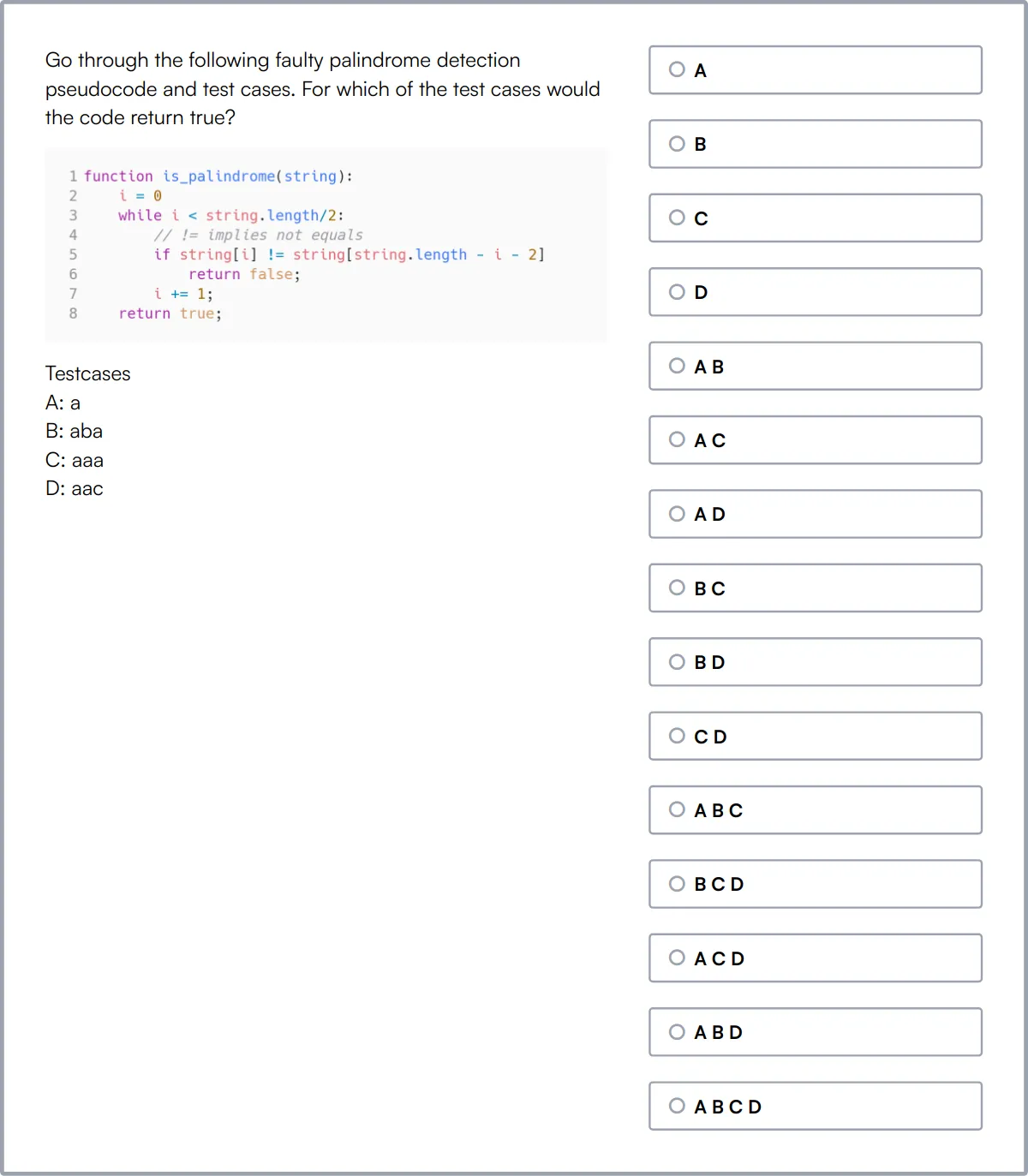
Problem Solving Test
Our Problem Solving Test measures a candidate's ability in abstract reasoning, critical thinking, and various forms of reasoning, which are key to effective problem-solving in complex scenarios.
This test challenges candidates to demonstrate their skills in logical reasoning, data interpretation, spatial reasoning, and abstract reasoning, providing insights into their problem-solving capabilities.
Candidates who score well are adept at analyzing data, identifying patterns, and applying knowledge to real-world problems, showcasing their learning agility and adaptability.
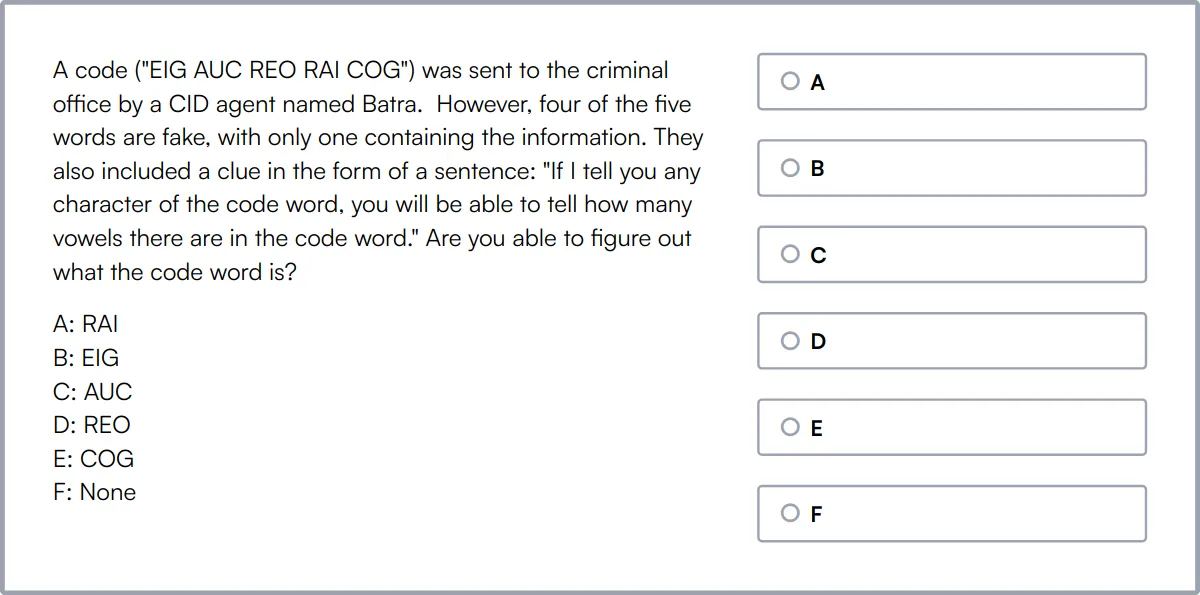
Project Management Test
Our Project Management Test assesses a candidate's ability to plan and execute projects, covering essential skills such as cost estimation, stakeholder management, and risk analysis.
The test evaluates understanding of project roles, stages, resource management, and both agile and traditional project management methodologies, ensuring candidates can handle diverse project demands.
High-scoring individuals excel in designing effective project plans, managing resources efficiently, and adapting to project changes, which are key for successful project delivery.
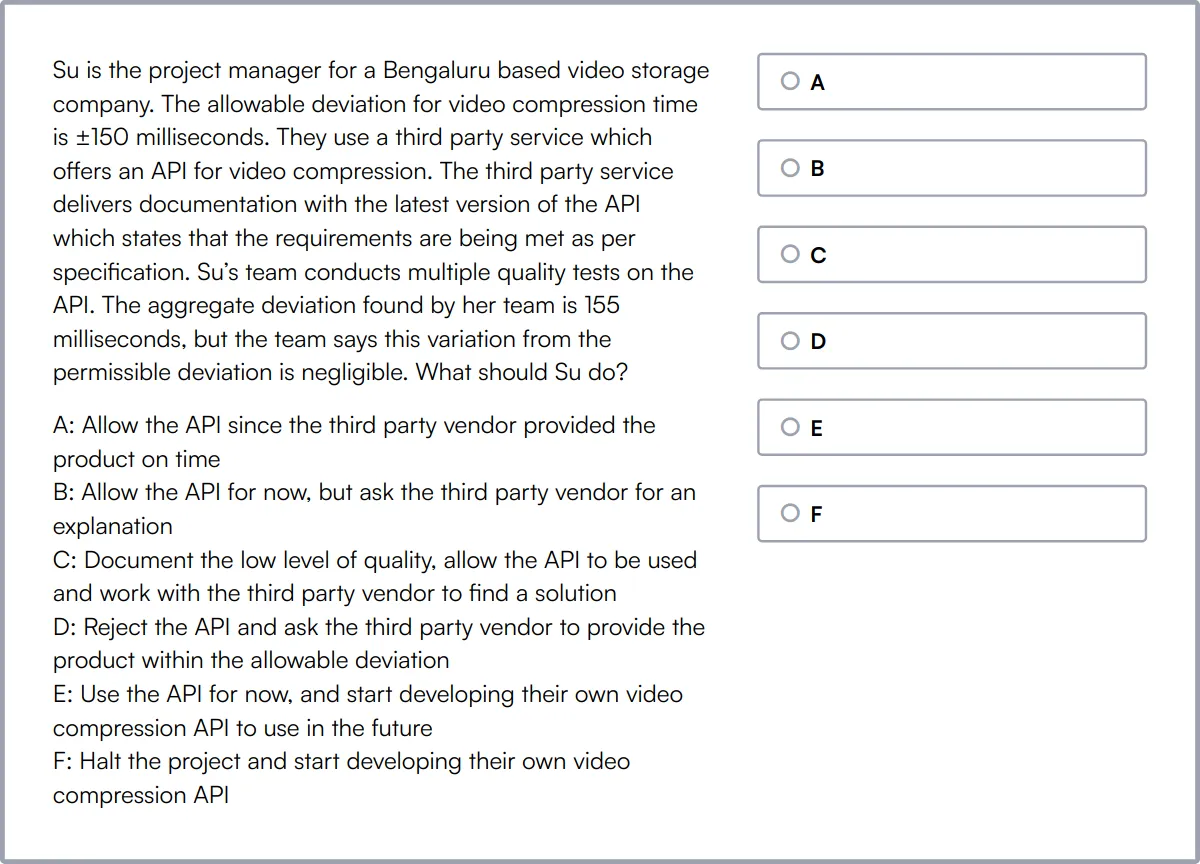
Communication Skills Test
Our Communication Skills Test evaluates candidates on their verbal and written communication skills, critical for effective collaboration and stakeholder management.
The test assesses candidates' abilities in active listening, interpersonal skills, and situational judgement, crucial for navigating professional scenarios.
Candidates who perform well are able to clearly articulate ideas, engage effectively with colleagues and stakeholders, and demonstrate strong verbal reasoning skills.
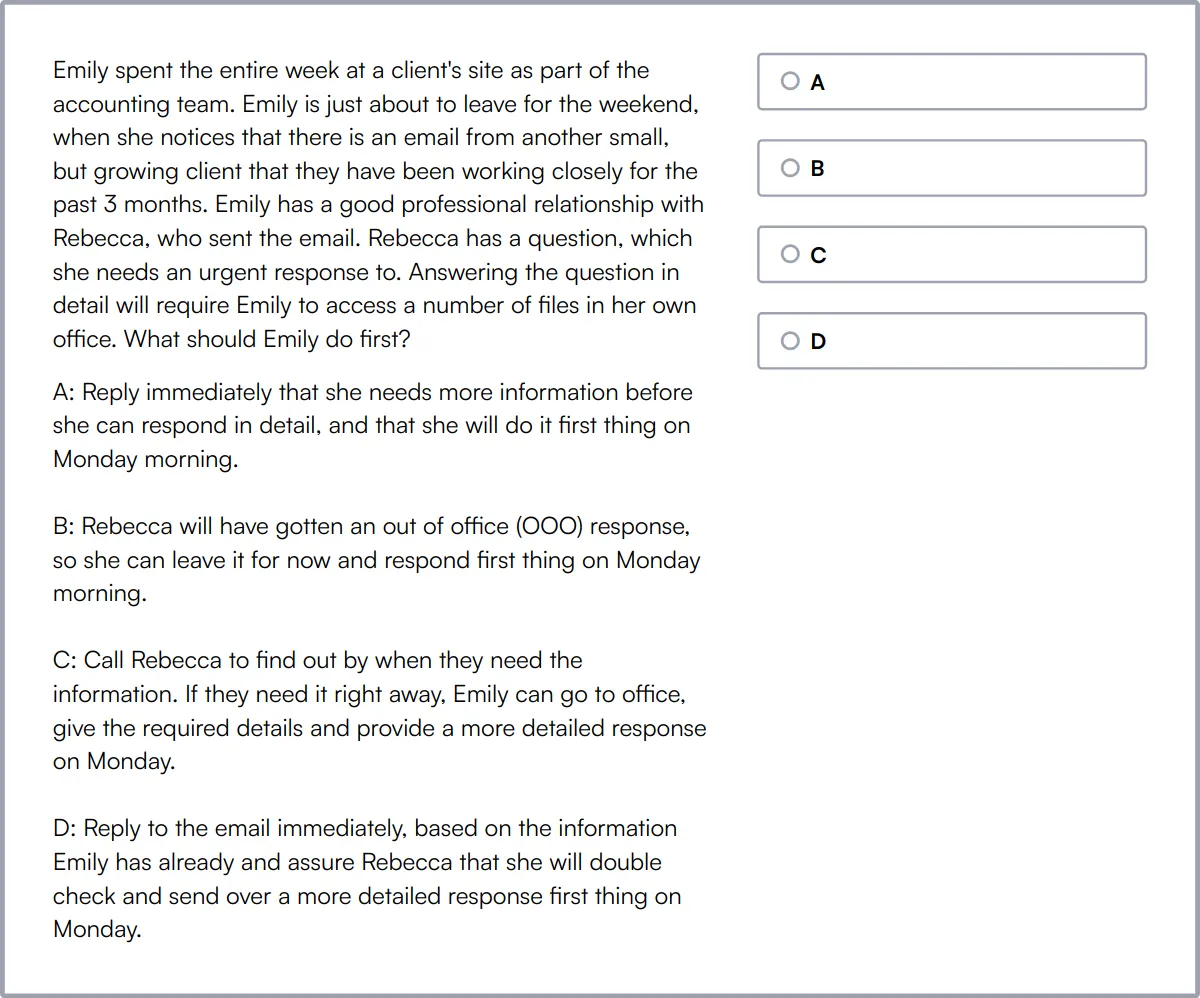
Analytical Skills Test
Our Analytical Skills Test measures a candidate's logical reasoning, data visualization, and numerical reasoning skills, essential for roles that require rigorous data analysis.
This test challenges candidates to demonstrate their ability to comprehend scenarios, identify key information, and apply logic to find patterns and draw conclusions.
High performers are proficient in analyzing complex data sets, which is indicative of strong problem-solving skills and the ability to make data-driven decisions.
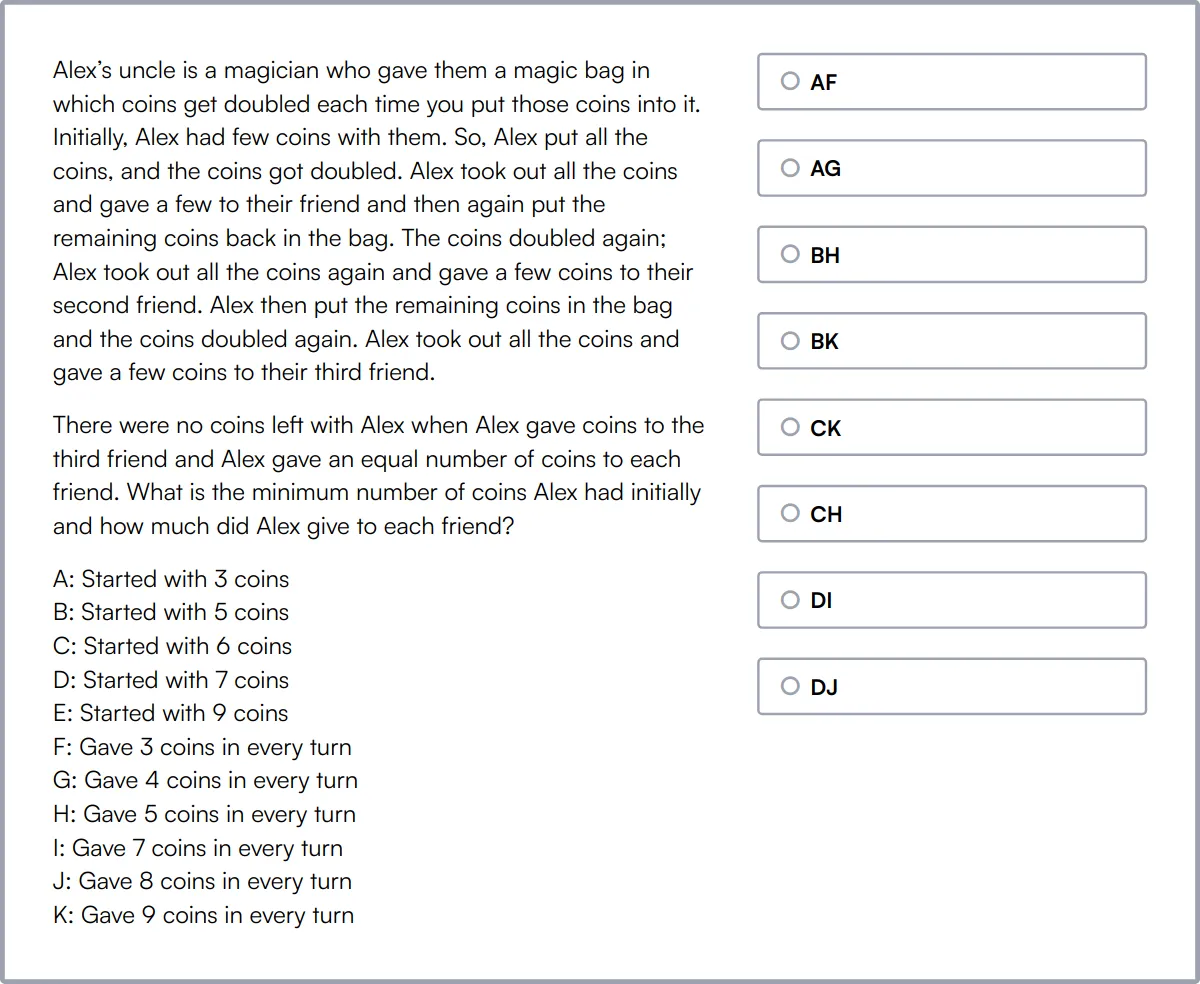
Cyber Security Assessment Test
Our Cyber Security Assessment Test evaluates candidates on their knowledge of network security, cyber attacks, cryptography, and web security, key for roles in IT security.
The test assesses candidates' abilities to detect and mitigate security risks, implement cybersecurity defenses, and understand protocols such as TLS and SSL.
Candidates who excel in this test demonstrate a thorough understanding of how to protect systems against various cyber threats and ensure data security.
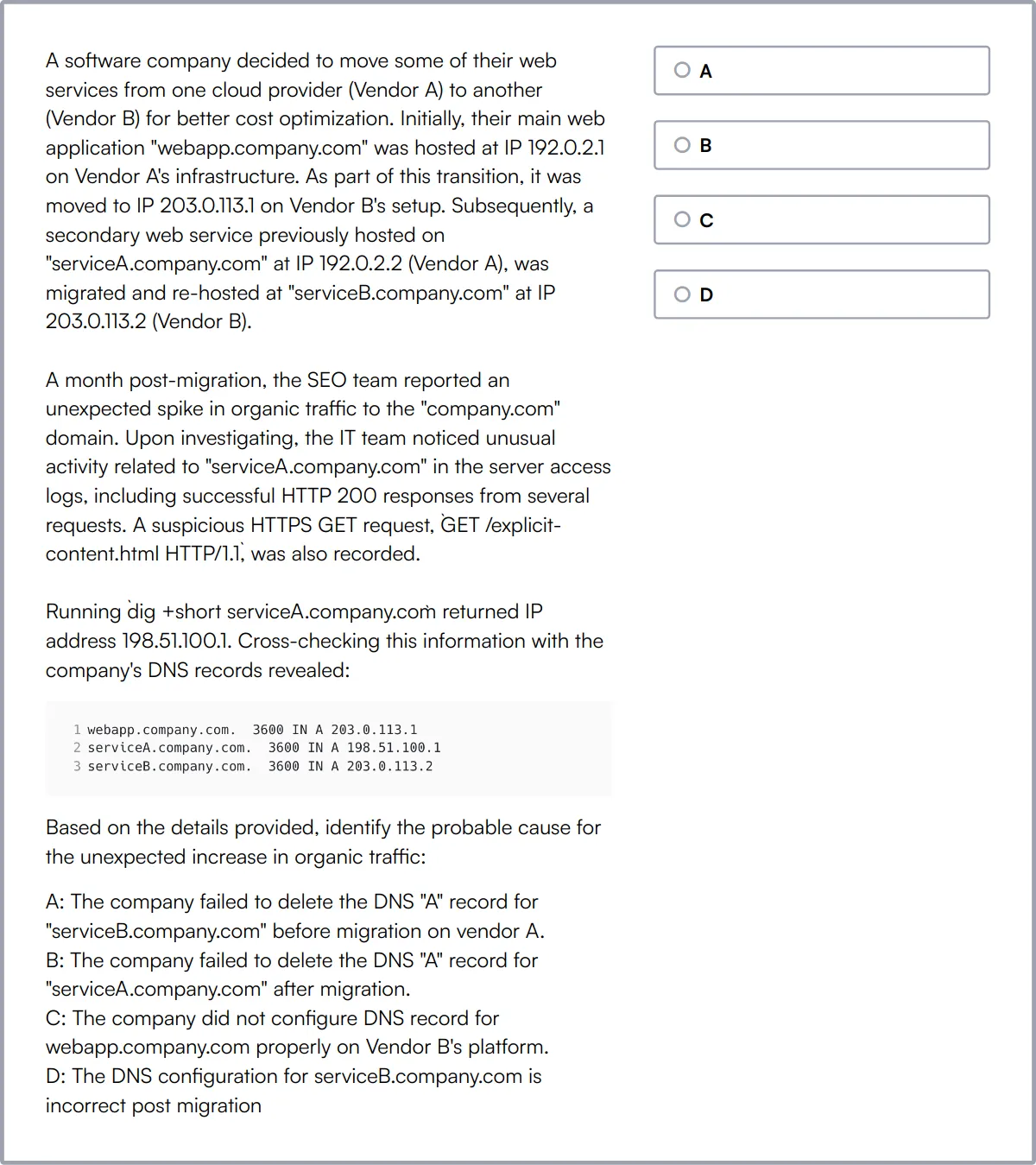
Summary: The 8 key IT Consultant skills and how to test for them
| IT Consultant skill | How to assess them |
|---|---|
| 1. Technical Expertise | Evaluate proficiency in relevant technologies and tools. |
| 2. Problem-Solving | Assess ability to identify and resolve complex issues. |
| 3. Project Management | Check skills in planning, executing, and closing projects. |
| 4. Communication | Gauge clarity and effectiveness in conveying information. |
| 5. Analytical Thinking | Measure capacity to analyze data and make informed decisions. |
| 6. Cybersecurity Knowledge | Evaluate understanding of security protocols and threat mitigation. |
| 7. Business Acumen | Assess understanding of business operations and strategy. |
| 8. Adaptability | Check ability to adjust to new technologies and environments. |
Business Analyst IT Test
IT Consultant skills FAQs
What technical skills should IT consultants possess?
IT consultants should be proficient in areas like software development, database management, and cloud computing. Familiarity with cybersecurity and IT compliance is also important to safeguard data and meet regulatory requirements.
How can problem-solving skills be assessed in IT consultants?
Assess problem-solving skills by presenting candidates with real-world IT scenarios that require innovative solutions. Observing their approach to these problems, including how they analyze and resolve issues, provides insight into their capabilities.
What is the importance of communication skills in IT consulting?
Effective communication is key in IT consulting to translate technical details into understandable language for clients and team members. It ensures that projects meet client expectations and are completed on schedule.
Why is business acumen important for IT consultants?
Business acumen helps IT consultants understand client business models and processes, enabling them to provide solutions that align with the client's strategic goals and enhance operational efficiency.
How can adaptability be evaluated during the hiring process for IT consultants?
Evaluate adaptability by discussing past experiences where the candidate had to adjust to significant changes or learn new technologies quickly. This reveals their ability to stay effective in the ever-evolving IT landscape.
What role does vendor management play in IT consulting?
Vendor management is crucial for negotiating with software and hardware suppliers, ensuring that the terms and costs align with client needs and project budgets. It also involves managing relationships and contracts effectively.
How important is cybersecurity knowledge for IT consultants?
Cybersecurity knowledge is critical to protect client data and ensure systems are secure from threats. IT consultants must be up-to-date with the latest security practices and technologies to advise and implement effective security measures.
What project management skills are necessary for IT consultants?
Project management skills are necessary to oversee IT projects from conception to completion, ensuring they are delivered on time, within budget, and to the client's specifications. Skills in scheduling, resource allocation, and risk management are key.

40 min skill tests.
No trick questions.
Accurate shortlisting.
We make it easy for you to find the best candidates in your pipeline with a 40 min skills test.
Try for freeRelated posts
Free resources



